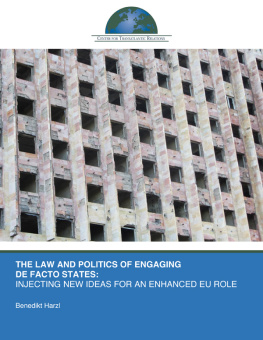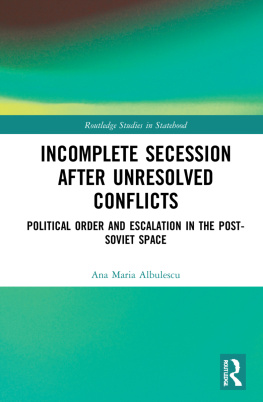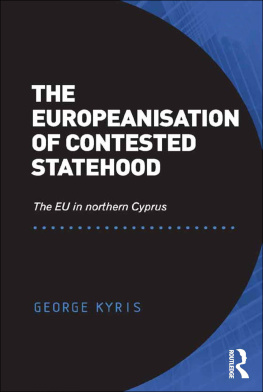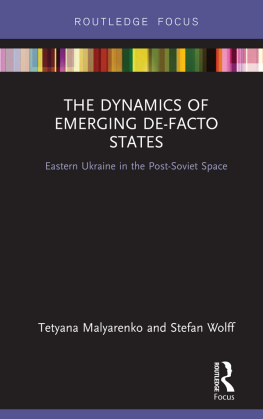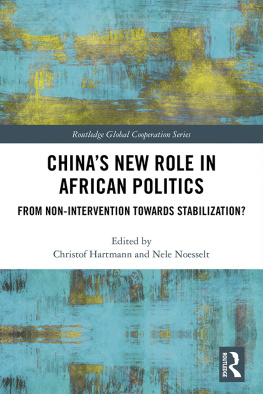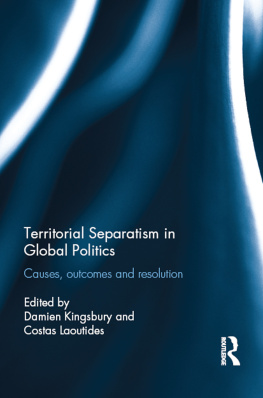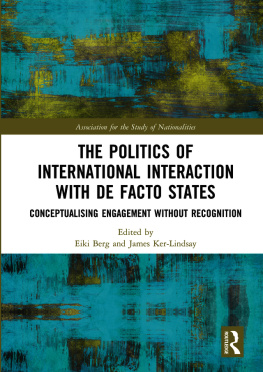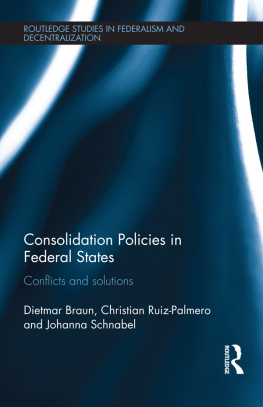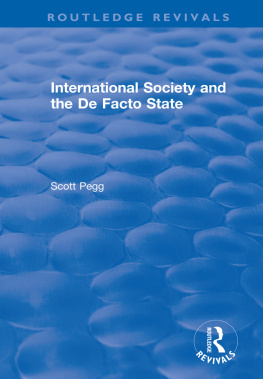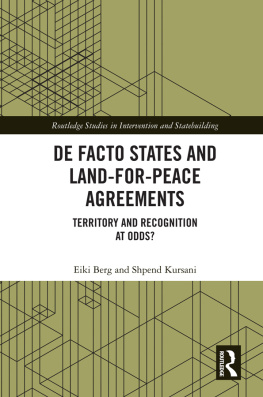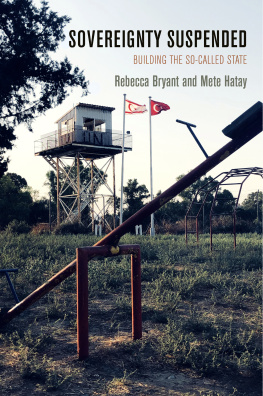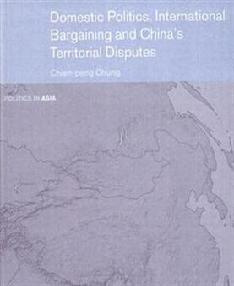Benedikt Harzl, The Law and Politics of Engaging De Facto States: Injecting New Ideas for an Enhanced EU Role
Washington, DC: Center for Transatlantic Relations, 2018.
Center for Transatlantic Relations, 2018
Funded by the Austrian Marshall Plan Foundation
Center for Transatlantic Relations
The Paul H. Nitze School of Advanced International Studies
The Johns Hopkins University
1717 Massachusetts Ave., NW, 8th floor
Washington, DC 20036
Tel: (202) 663-5880
Fax (202) 663-5879
Email: transatlantic@jhu.edu
http://transatlantic.sais-jhu.edu
ISBN 978-1-947661-05-9
Introduction
The territorial disputes of the Southern Caucasus that remain unresolved today represent a permanent and sad reminder that the optimism that endured throughout 1989 and 1991
The conflicts that have shaken up the entire region after the collapse of the Soviet Union have been thoroughly covered by academic scholarship. They have received scholarly attention through methodological approaches, which emphasize the strategic importance of the region of the South Caucasus. Conveniently located between the Black and the Caspian Seas and at the interface between Christianity and Islam, This is not to argue that these local narratives have been shared by the respective societies unanimously, instead they have been often too easily and rather uncritically picked up by observers and have shaped how we understand the logic of these conflicts.
This interplay between local narratives and outside observation has not been entirely helpful. It has allowed viewing conflicts such as those in Georgia exclusively through the lenses of proxy wars, which generally amounts to lazy analysis. By dismissing sources of support other than those provided by the patron state, we run into the trap of buying into the preferred discourse(s) of all conflict parties. By portraying these territorial issues as geopolitical confrontations with hardly any local dynamics, the parties can easily disengage and choose not to participate in substantial talks. The question of how power sharing and subsequent constitutional law arrangements can be accommodated after those conflicts has hardly been addressed at all.
Domestic factors that have contributed to these conflicts have been aptly researched as well. Part of these approaches was focusing on the critical dimension of the role of national elites and the mobilization tools used, thereby creating a security dilemma that quickly provided the opportunity to armed conflict. In particular, scholars such as Stuart Kaufman have, in this context, provided a most valuable glimpse into a reinvigorated primordialism v. constructivism debate, through which it is claimed that ethnic symbols and historical (competing) narratives have equally provided their share for the conflicts of the region.
However, the de facto states of the South Caucasus have already existed for 25 years. Given their longevity and the growing intractability that comes as a byproduct, it seems to have become a commonplace to maintain that there is no silver bullet that would quickly reconcile the divided societies. The question remains and will, for the time being, continue to remain how those entities ought to be addressed in a meaningful way to keep some form of rapprochement and institutional power sharing on the radar, no matter how much distant such a perspective may seem.
The fact that the disputes over these conflicts oscillate around core principles of international law be it the right to self-determination of peoples or the prohibition of force forces the observer to integrate the law aspect into the analysis. Indeed, the conflicts over disputed territories represent primary examples of how politics and law are mutually implicated and mutually informed. As a consequence, in these scenarios one is sometimes confronted with politicized law and legalized politics. Yet, this does not necessarily mean that the legal analysis should be restricted to a mere compliance question, which presupposes a context in which law is distinguished from agent. The question, for instance, of whether or not Nagorno-Karabakh is entitled to exercise a right to secede from Azerbaijan on the grounds of the principle of self-determination is to be asked separately from the interaction of law and politics, whereby this very interaction occurs in the domain of It is therefore also for this reason, that the legal aspect must represent an indispensable component of any meaningful attempt to grasp the underlying notions of those territorial conflicts.
With the adoption of the Belovezh Accords in December 1991, the Soviet Union was considered to have also formally ceased its existence.
Throughout this work, Georgia and Azerbaijan are referred to as metropolitan states with respect to the(ir) disputed territories. The author of the present work rejects the terminological concept of a mother state or parent state and other equally problematic denominations which fail, thus the author, to escape the bias trap. He maintains that, in particular for a legal analysis, the term metropolitan state resonates much better also with regard to international law scholarship in the field. See, e.g. Jorri C. Duursma, Fragmentation and the international relations of Micro-States. Self-determination and statehood (Cambridge: Cambridge University Press, 1996); James Crawford, The Creation of States in International Law (New York: Oxford University Press, 2006).
This paper will not analyze or assess the extent of external support for the secessionist movements in all three cases. It will, rather, treat the de facto states resulting from the armed conflicts as consolidated entities which will exist for an indefinite period of time. Nevertheless, support by third states has always been a crucial factor in these conflicts, although not the only source of support.
Indeed, Charles King has framed this quite convincingly: The territorial separatists of the 1990s have become the state builders of the 2000s creating de facto countries whose ability to field armed forces, control their own territory, educate their children is about as well developed as that of the recognized state of which they are still notionally a part. See: Charles King, The Benefits of Ethnic War Understanding Eurasias Unrecognized States, in: World Politics (Vol. 53, No. 4, 2001), 524-552, 525.
De facto states do, albeit on a modest level, provide health care and other public services.
The very first documented instances of organized violence have been reported from Azerbaijan and Nagorno-Karabakh already by 1988.
Brenda Shaffer argues convincingly that [t]he Caucasus is an excellent laboratory for testing the influence of religious and cultural differences on the emergence of alliances and rivalries. See: Brenda Shaffer, The Geopolitics of the Caucasus, in: Brown Journal of World Affairs (Vol. XV, No. 2, 2009), 131-142, 132.
Stuart Kaufman, Modern Hatreds: The Symbolic Politics of Ethnic War (New York: Cornell University Press, 2001), 94.
Nina Caspersen, Playing the Recognition Game: External Actors and De Facto States, in: The International Spectator (Vol. 44, No. 4, 2009), 4760; Annie Jafalian (Ed.), Reassessing Security in the South Caucasus: Regional Conflicts and Transformation (New York: Routledge, 2011); Dov Lynch, Engaging Eurasias Separatist States - Unresolved Conflicts and De Facto States (Washington, DC: United States Institute of Peace Press, 2004).

